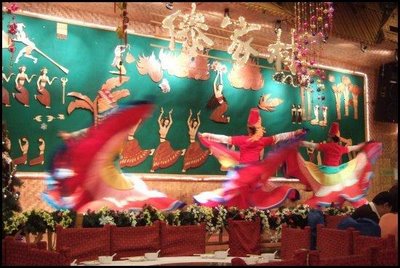
(Xinhua) Updated: 2006-08-31 22:57
BEIJING -- Feng Shui is gaining popularity in China's affluent coastal cities including Guangzhou, Shanghai and Shenzhen, although it is still illegal. Many Feng Shui masters have established consultancy firms, offering advice on issues such as career, marriage, health, debt, investment, study and names according to Feng Shui principles. More than 1,000 Feng Shui guides work in agencies in Shanghai, according to Wang Xiaohe, manager of a Shanghai-based Feng Shui company.
"Feng Shui is widely applied in interior decorating and real estate, so it has attracted many estate agents and entrepreneurs," says Wang. Feng Shui is the ancient practice derived from the ideas in the Book of Changes, an ancient Chinese divination and philosophical manual.
It involves ensuring a good flow of energy, or qi. Buildings and other structures need to face certain directions depending on their surroundings. Elements such as wood, fire and earth have to be carefully balanced. It is necessary to avoid random and haphazard arrangements of furniture and accessories according to Feng Shui guides. Wang says many entrepreneurs will consult on the future of their businesses, while estate agents are more likely to consult on the position of furniture and the environment of their projects.
Consultants usually charge 30 yuan (US$3.75) per square meter for property advice and 300 yuan (US$37.5) per half hour for other services. Advice on the name of a person or a company can cost from 800 to 1,800 yuan (US$225), Wang said, adding prices are negotiable according to the customer's means. The influx of residents from Hong Kong, Macao and Taiwan, where Feng Shui is legal and commonly used, has contributed to its popularity, says Zhang Zhizhe, chairman of the Shanghai Yi Jing Institute.
"My company is small, but we have long-term clients and have already made a lot of money," says Li Xiuxia, manager of another Shanghai-based consultancy, adding it planned to advertise to attract more customers. The Yi Jing Institute is trying to list Feng Shui as a world intangible cultural heritage, but as long as it remains illegal, this could prove to be difficult.
"Feng Shui guides usually start out as consultancy companies, otherwise the administrations of industry and commerce would prohibit them from operating as the public practice of Feng Shui is illegal," says Zhang.
Professor Yu Wujin, of Fudan University philosophy department, says, "They change the name from 'Feng Shui' to 'consultant' to avoid being considered 'superstitious' by the public, but it also suggests a wider and more modern definition of 'Feng Shui'." Yu believes the consultants are exploiting modern anxieties in a competitive society. "In a market economy, people wish to lower the risk of failure and danger in their lives and work and turn to the Feng Shui masters for help."
The practice of Feng Shui was made illegal after the founding of the People's Republic of China in 1949 as the new government determined to eliminate the "four olds", namely the old ideas, old culture, old customs and old habits. The Shanghai Administration of Industry and Commerce could give no numbers or identities of consultant companies involved in Feng Shui practice, but said their businesses were legal in terms of the registration procedure. Feng Shui is a part of China's traditional culture, which has never really died out, says Zhang Zhizhe. "Feng Shui guides solve modern problems in a traditional way."
To get a free estimate on a full-blown Feng Shui Consultation, visit our website, Feng Shui Style.